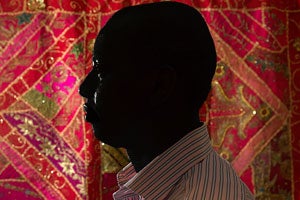The following is excerpted from “The long journey to asylum,” a feature by Corydon Ireland that appeared in the Harvard Gazette on Aug. 3, 2012.
One afternoon in late July, a 39-year-old African man we will call Jean-Paul took the elevator to the third floor of Harvard Law School’s (HLS) Wasserstein Hall. He walked into the Harvard Immigration and Refugee Clinic and was greeted like a hero.
By one definition, Jean-Paul qualifies as such. He’s an African Odysseus whose long journey and personal trials include a family massacre, days of torture, months of fearful hiding, and a thriller-like escape from his native Burundi.
In the classics, a hero also returns home, but for Jean-Paul — now employed at a Boston parking garage — there is no going back. The United States is now his home. When he arrived in Washington, D.C., as an exile in 2006, he had a visa, two changes of clothes, and $5.
Jean-Paul’s next test of strength started a month later, with his legal appeal for asylum. This legal status guarantees aliens some “protection from return” to a native land where imprisonment and even death might await them. This legal status guarantees aliens some “protection from return” to a native land where imprisonment and even death might await them.
On May 30 of this year, Jean-Paul finally was granted asylum in Boston Immigration Court. Helping him during the last two years were lawyers and law students at the Harvard clinic. They worked for months with Jean-Paul, listening to his story, helping him to overcome his trauma, honing his testimony, gathering a yard-high stack of legal paperwork, and arguing the final case in court. When the judge declared that Jean-Paul was granted asylum, he was stunned yet ecstatic. He turned to his main lawyer and said, “This is my day.” … Read the full story at the Harvard Gazette online
